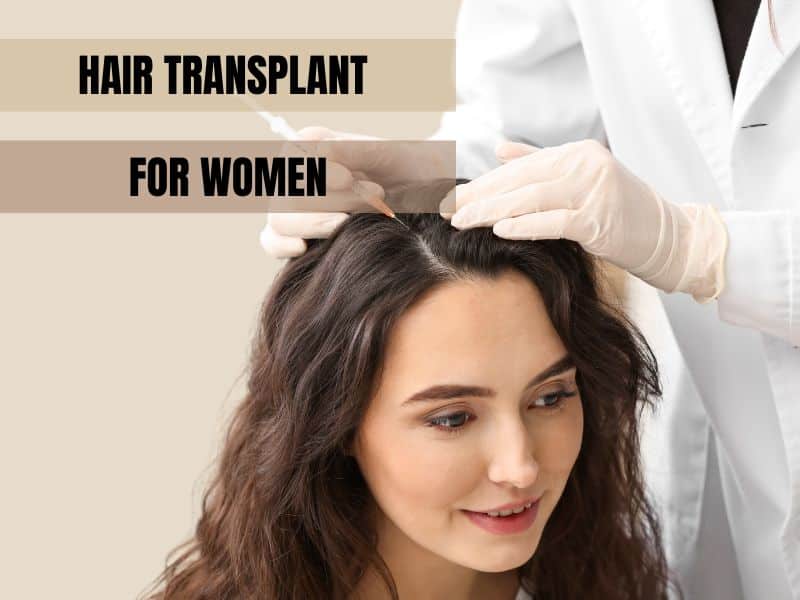Hair Transplant for Women FAQs
Female pattern hair loss and generally thinning hair among women can cause an immense amount of emotional distress and discomfort. The good news is, a hair transplant for women can restore your confidence and rejuvenate your appearance.
Naturally, as you consider your female hair loss and think about undergoing a female hair transplant procedure, you will have questions. The following is a list of commonly asked questions surrounding female hair transplants and treating female hair loss.
FAQs: Hair Transplants for Women
 What Is a Hair Transplant for Women?
What Is a Hair Transplant for Women?
Women’s hair transplants, also known as female hair restoration surgery, is a procedure designed to address hair loss, hair thinning, or a receding hairline in women. The process is basically the same as the process for a male hair transplant.
During this surgery, a hair transplant surgeon will take existing hair follicles from areas of the scalp where hair is dense, such as the back or sides of the head. These transplanted follicles are then transplanted to areas experiencing hair loss or thinning. This will, in turn, restore and improve hair density.
What Causes Female Hair Loss?
Women’s hair loss is more common than you may think, and it can be caused by medication use, certain medical conditions such as androgenetic alopecia, changes in hormones, trauma, and other reasons.
1. Female Pattern Hair Loss (FPHL): Female pattern hair loss, also known as androgenic alopecia, is the most significant cause of hair loss. This usually happens to women after menopause (around 40s or 50s). It involves the progressive shrinking of hair follicles, leading to thinning and falling of hair.
2. Hormonal Changes: Hormonal fluctuations, particularly involving androgens, can significantly impact hair growth. Conditions such as polycystic ovary syndrome (PCOS) lead to elevated androgen levels, resulting in symptoms like hair thinning on the scalp and increased facial hair. Menopause also will also cause you to lose hair due to decreased estrogen levels.
3. Medical Conditions and Medications: Underlying health issues, including thyroid disorders, anemia, and autoimmune diseases like alopecia areata, can cause hair loss. Certain medications also can lead to gradual thinning of hair. These include medications for blood pressure, gout, and high doses of vitamin A.
4. Nutritional Deficiencies: A lack of essential nutrients, particularly iron, zinc, and vitamin D, can impair hair growth. Studies have shown that iron-deficiency anemia is associated with hair loss.
5. Physical and Emotional Stress: Significant physical or emotional stress can trigger a type of hair loss known as telogen effluvium, where hair prematurely enters the shedding phase. This condition often arises after events like major surgery, severe illness, medication, hormonal changes, or psychological stress.
6. Harmful Hair Care Practices: Tight hairstyles that pull on the hair follicles, can lead to traction alopecia. This form of hair loss is particularly common among women who frequently wear braids, ponytails, or updos that cause tension on the scalp. Regular use of chemical hair treatments can also damage healthy hair follicles.
Am I a Candidate for a Female Hair Transplant Procedure?
Ideal candidates for hair loss treatment are experiencing hair loss in certain areas but also have sufficient healthy individual hair follicles available for transplantation. In order to ultimately determine if you are a suitable candidate for treating hair loss, you’ll need to book a consultation appointment with a plastic surgeon.
Is Hair Transplant Surgery Painful?
You will be comfortable during your hair transplant surgery due to numbing agents and/or anesthesia. But afterward, you will likely experience some discomfort as you heal. Hair treatments typically come with a fairly easy recovery, but if you do experience pain that is severe enough, pain medication can be prescribed.
Is there any medication available for hair loss?
Yes, several medications are available for treating hair loss in women. Minoxidil is an FDA-approved topical treatment that stimulates hair follicles and promotes growth, while oral medications like spironolactone and finasteride help block hormones linked to hair thinning.
Flutamide is another anti-androgen that may be effective, and addressing nutritional deficiencies, such as zinc, can also support hair health. Consult a healthcare provider to determine the best treatment based on the cause of hair loss.
What are the types of hair transplant procedures?
There are two main types of hair transplants that women choose. The first is the Follicular Unit Transplantation (FUT) – Also known as the strip method, FUT involves removing a strip of scalp from the back of the head. It will be dissected into individual follicular units, and transplanted to the thinning areas. This method can leave a linear scar but allows for the transplantation of a large number of grafts in a single session.
The second is the Follicular Unit Extraction (FUE). In FUE, hair follicles are extracted directly from the scalp using a micro-punch tool and implanted into the thinning or bald areas. This technique leaves minimal scarring. It has a quicker recovery time than FUT, but may require multiple sessions for optimal results.
Are there any psychological effects of hair loss?
Yes. A 2022 study by NAAF found that adults with alopecia areata are 30% to 38% more likely to be diagnosed with depression. Other research also highlights that alopecia areata can severely impact mental health and employment, particularly among non-White individuals.
What Is Hair Restoration Surgery Recovery Like?
After a hair transplant procedure, it’s normal to experience some swelling, bruising, and tenderness in the treatment area. Patients with severe pain can get prescribed pain medications to manage discomfort, but these are typically only necessary for a few days, at which point most patients can transition to an over-the-counter pain med.
When Can I Resume Normal Activities After a Hair Transplant Procedure?
The majority of patients can resume their normal activities within a few days to a week after surgery, although strenuous activities should be avoided for at least two weeks.
What Does It Mean if My Hair Falls Out After Surgery?
The transplanted hairs may initially shed; however, do not be shocked by this. New hair growth typically begins to emerge soon after, and the thinning areas should see new hair regrowth very shortly. For severe hair loss in women, it may take longer to regrow hair.
What’s the difference between hair implants and hair transplants?
Hair transplants use your own hair follicles, typically from the back of the scalp, and relocate them to thinning areas. Hair implants, on the other hand, involve synthetic or artificial hair fibers implanted into the scalp. These hair implants do not grow like natural hair.
Are the Results Permanent?
When performed correctly, transplanted hair should flourish, and your results should be permanent.
However, keep in mind that if a certain medication or condition causes you to notice hair thinning in the first place, you may end up with more thinning hair after a FUE hair transplant if the original cause was not taken care of. Still, most hair transplants are successful and lead to many years of healthy hair growth.
Hair Transplant Before and After
What Are the Risks and Complications?
As with any surgical procedure, hair loss treatments that require surgery come with the risk of potential complications. These may include:
- Infection
- Bleeding
- Itching or numbness in the treatment area
- Noticeable scarring
- Varying degrees of hair loss
- Unsatisfactory results
How Much Is Hair Transplant Cost For Women?
During your consultation, your hair transplantation surgeon can provide you with a personalized price quote based on your unique goals and treatment needs. Your ultimate hair transplant cost will depend on surgeon’s fees, anesthesia requirements, how much hair you want transplanted, and other factors.
Will Insurance Cover the Cost of Surgical Hair Restoration?
Generally speaking, no. In rare cases, insurance may cover follicular unit extraction for hair loss caused by serious medical conditions. However, most providers do not cover this procedure.
Is Hair Transplant for Black Women Different?

Still, a skilled and well-qualified hair transplant surgeon is fully capable of achieving successful female hair transplant surgery for Black women.
Can Hair Grow Back From Female Pattern Baldness?
If hair loss due to female pattern baldness has occurred, regrowth typically won’t happen without a female hair restoration procedure. However, effective surgical treatment can halt further loss and facilitate the regrowth of some hair.
Where Does Donor Hair Come From In A Female Hair Transplant?
In female hair transplants, donor hair is typically harvested from areas of the scalp resistant to balding, such as the back or sides. These regions, known as the stable donor zone, provide hair follicles that are less susceptible to hormonal hair loss, ensuring successful transplantation.
Where Can I Get A Female Hair Transplant Near Me?
If you have hair that is thinning and hair loss, you can seek female hair transplantation surgery in your area by searching for hair transplant plastic surgeons in your area. Dr. David Sieber is a double board-certified plastic surgeon performing hair transplants at his San Francisco practice.
What do celebrities do for hair loss?
Hair loss can affect anyone, celebrities included. While numerous treatments exist, celebrity hair transplant stands out as the preferred permanent solution.
Arrange a Consultation Appointment Today
If you are considering a female hair transplant surgery but still aren’t sure if it’s right for you, we invite you to create a list of your own questions for your surgeon. To start your hair restoration journey, you will need to schedule a consultation appointment with a board-certified plastic surgeon such as double board-certified surgeon Dr. David Sieber.
You can bring this list of questions to your consultation with Dr. Sieber and he will be happy to answer them. Please contact us today to set up your appointment with a hair restoration surgeon, and we look forward to hearing from you.




 What Is a Hair Transplant for Women?
What Is a Hair Transplant for Women?

